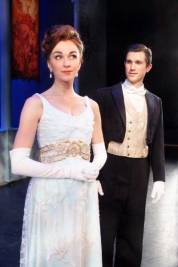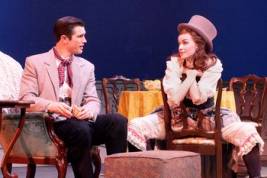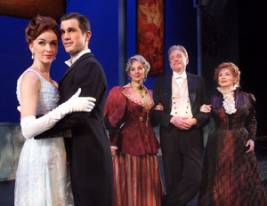
You can probably count on the fingers of one hand the number of movie musicals that have been turned into Broadway shows. Chitty Chitty Bang Bang. Thoroughly Modern Millie. Seven Brides For Seven Brothers. Gigi. If you don’t count Disney animated films like Beauty And The Beast (in a class by themselves) and movies like Footloose and Saturday Night Fever (whose characters don’t burst into song), the list is a short one indeed.
For this reason alone, Reprise’s revival of 1973’s rarely-if-ever produced Gigi (based on the multiple Academy Award-winning Best Film Of 1958) is cause for interest. Add to that the fact that Gigi The Movie was Alan Jay Lerner and Frederick Loewe’s follow-up to their mega-smash My Fair Lady and preceded their last Broadway hit Camelot, and you have a show that many a musical theater lover has put on his or her wish-to-see list.
With Gigi chez Reprise coming just over a year after the Pasadena Playhouse’s out-and-out brilliant revisal of Camelot, Jason Alexander and company could not have found a director more suited to the task of turning a Broadway misfire into a 21st Century hit than Camelot/Gigi director David Lee.
Though not quite in a league with Camelot, Gigi nonetheless proves an entertaining two hours of romance and nostalgia, particularly when its young stars Lisa O’Hare and Matt Cavenaugh take centerstage.
Film buffs (or fans of Collette’s original French novel) will recall Gigi’s plot—the tale of an 18ish-year-old mademoiselle being groomed in turn-of-the-20th-Century Paris to follow in the footsteps of her courtesan mother and grandmother, footsteps requiring extensive lessons in etiquette and charm. A frequent visitor to the apartment Gigi shares with her grand-mère Madame Alvarez is rich, handsome, bored Gaston Lachailles, whose afternoons chez Mamita are refreshing respites from the life he lives as a love-em-and-leave-em bon vivant.
Then, one day, Gaston makes an extraordinary discovery—that Gigi is “no longer the funny, awkward little girl” he used to know, but a young woman who seemingly overnight has undergone “a breathless change,” whose “sparkle” has “turned to fire,” whose “warmth” has “become desire”—and Gaston resolves to set her up in a life of luxury. There’s only one hitch, and that is whether Gigi will settle for an arrangement that would make her the object of near-constant gossip and innuendo, or at least until Gaston found a replacement for her as Frenchmen of that era always did.
Director Lee’s concept in revising Gigi is similar to the one that worked so well for Camelot. He’s gone back to the source materials (and in this case, a mostly forgotten 1985 London revival) to get at the heart of the tale, a sweet and tender love story somewhat overshadowed by the movie’s (and the original Broadway production’s) pomp and splendor. Lee cuts the Broadway cast of over thirty down to just thirteen, six of whom serve as the song-and-dance ensemble and portray various minor characters, with featured player Jason Graae playing seven, count’em, seven supporting parts.
The result is a somewhat mixed (though mostly positive) one. On the minus side, production numbers seem underpopulated when only six are dancing. On the plus side, a scaled-down Gigi allows us to focus on the more intimate stories being told.
Still, despite whatever tweaking has been done to the Broadway original, the very best reason to see this Gigi is its star, the incandescent O’Hare, whose performance in the 2008 National Tour of Lerner & Loewe’s My Fair Lady helped make it quite possibly the finest production ever of that Broadway classic. O’Hare is so absolutely captivating as Gigi and sings in such a glorious soprano that one can’t help wishing that she had the stage time you might expect from a character with a musical named after her. Though L-&-L gave Broadway’s Gigi two lovely new songs (“The Earth And Other Minor Things” and “In This Wide Wide World”), they take the place of two of the movie’s very best (“I Don’t Understand The Parisians” and “Say A Prayer For Me Tonight”), whose excision borders on the criminal. If this reviewer had his way, Gigi would get to sing all four, and a short dialog scene would take the place of Act Two’s extended and largely superfluous “The Contract.” (No offense to the five actors who perform it quite splendidly at Reprise.)
The second best reason to see Gigi is O’Hare’s costar Cavenaugh, whose matinee idol good looks (an understatement) are matched by the Broadway star’s vocal prowess, acting chops, and comedic skills. O’Hare and Cavenaugh are so darned appealing that time spent away from them will likely leave you—as it did this reviewer—longing for more.
William Atherton makes for an effective Honoré, and gets to sing “Thank Heaven For Little Girls,” but the memory of Maurice Chevalier is hard to erase (and the song rings a bit borderline-icky to 21st Century ears). There are no complaints whatsoever about Broadway-West End legend Millicent Martin, as bubbly and winning as ever in the role of Mamita. Together, Atherton and Martin make the nostalgic duet “I Remember It Well” something to remember.
Scenie-winning actress Susan Denaker is a deliciously dry Aunt Alicia, Gigi’s coach in a courtesan’s arts; Chrissie Whitehead makes for a saucy, pouty Liane; and Graae (another SSLA Award-winner) is (what else?) an inspired scene-stealer in a septet of roles, each with its own wig, facial hair, and vocal patterns and each one a sheer delight.
Angela Ara Brown, Richard Bulda, Luke Lazzaro, Jonathan Sharp, Leslie Stevens, and Yvette Tucker give proof that the days when Broadway performers were either actors, singers, or dancers are long gone, and the sextet go a long way towards making one forget there are only half a dozen dancers in the Bois De Bologne or Maxim’s.
Choreographer Peggy Hickey’s scaled-down dance numbers are bright and lively. Musical director Steve Orich conducts a spectacular onstage twenty-piece (!) orchestra.
Design elements are all quite terrific, though considerably reduced from what must have been original Broadway scale, from Tom Buderwitz’s lovely scenic design (with its turn-of-the-century paintings) to Kate Bergh’s lush costumes, to Jared A. Sayeg’s vivid lighting, to Philip G. Allen’s crystal-clear sound design. Steven Smith is associate music director. Jill Gold is production stage manager.
Even in its revised form, Gigi still comes across as minor Lerner & Loewe. Then again, how can any songwriting team ever hope to top, or even equal, My Fair Lady. Regardless, with director Lee in the driver’s seat, O’Hare and Cavenaugh making hearts skip a beat, and songs like “It’s A Bore,” “The Night They Invented Champagne,” and the unforgettable title song, Gigi has multiple charms to offer musical theater connoisseurs.
Freud Playhouse, 245 Charles E. Young Drive East, UCLA Campus, Los Angeles.
www.reprise.org
–Steven Stanley
February 23, 2011
Photos: Ed Krieger





 Since 2007, Steven Stanley's StageSceneLA.com has spotlighted the best in Southern California theater via reviews, interviews, and its annual StageSceneLA Scenies.
Since 2007, Steven Stanley's StageSceneLA.com has spotlighted the best in Southern California theater via reviews, interviews, and its annual StageSceneLA Scenies.







 COPYRIGHT 2024 STEVEN STANLEY :: DESIGN BY
COPYRIGHT 2024 STEVEN STANLEY :: DESIGN BY